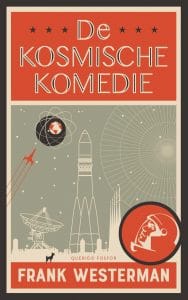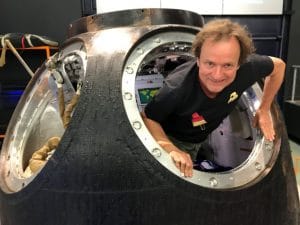Op het moment dat Covid-19 het normale leven platlegde, had Frank Westerman gelukkig zijn research voor zijn nieuwe boek al gedaan. Om voor zijn ouders te zorgen woonde hij ineens weer drie maanden ‘thuis’, op zijn jongenskamer aan de rand van Assen. Het schrijven bood hem de kans te ontsnappen naar hemelse sferen: De kosmische komedie gaat over de menselijke fascinatie voor het universum.
En passant maakt de lezer een boeiende reis, van Westerbork en Franeker naar Venetië en Florence, door vier eeuwen astronomie en ruimtevaart waarin Nederlanders een verrassend grote rol hebben gespeeld.
 ‘Vanuit mijn ouderlijk huis tot aan Radiosterrenwacht Westerbork is het hemelsbreed zo’n 8 kilometer,’ vertelt Westerman. ‘Ik ging veel hardlopen en rekte mijn gebruikelijke afstand van 10 kilometer steeds iets meer op, zodat ik heen en weer kon rennen naar het ‘fluisterbos’ van mijn jeugd. Daar staan die prachtige majestueuze schotels, antennes van 25 meter in doorsnede, te luisteren naar de kosmos, naar de echo van de oerknal. Het weggetje naar die telescopen heet Hemeloor.’
‘Vanuit mijn ouderlijk huis tot aan Radiosterrenwacht Westerbork is het hemelsbreed zo’n 8 kilometer,’ vertelt Westerman. ‘Ik ging veel hardlopen en rekte mijn gebruikelijke afstand van 10 kilometer steeds iets meer op, zodat ik heen en weer kon rennen naar het ‘fluisterbos’ van mijn jeugd. Daar staan die prachtige majestueuze schotels, antennes van 25 meter in doorsnede, te luisteren naar de kosmos, naar de echo van de oerknal. Het weggetje naar die telescopen heet Hemeloor.’
Hemel en hel
Een bizar en symbolisch gegeven dat op het terrein van voormalig deportatiekamp Westerbork later een Radiosterrenwacht is verrezen: hemel en hel komen hier letterlijk samen.
‘Ja, zoiets verzin je niet. Van kinds af aan kreeg ik mee dat je het goede moet nastreven. Niet: het goede leven. Toen ik op de middelbare school het dagboek van Etty Hillesum las over kamp Westerbork, waar het kwaad de dienst uitmaakte, sloeg dat dan ook een barst in mijn wereldbeeld. Westerbork was tijdens de Tweede Wereldoorlog een stad op zich, omheind met prikkeldraad en wachttorens, maar ook met een schouwburg, revues en sportwedstrijden. En dan elke dinsdag een transport. Datzelfde bos waar ik als kind droppings had, dat ik tot dan toe kende als het fluisterbos van de telescopen, bleek ineens ook het fluisterbos van de deportatie van 102.000 mensen, voornamelijk Joden, naar de concentratiekampen in Duitsland en Polen. Dit gegeven werd het scharnierpunt van mijn boek.’
In een aflevering van Planet Earth zei bioloog David Attenborough dat we meer weten van de maan dan van de bodem van de oceaan op onze eigen planeet. Wat zegt dat over de mens?
‘In De goddelijke komedie had Dante een kraakhelder beeld gegeven van de ordening van het universum. In dat epische gedicht verbond hij hemel, waar de beloning wachtte als je een goed mens was geweest, en hel, die zich onder de grond bevond. Tweeduizend jaar lang was dat een moreel kompas geweest, maar toen Galileo in 1609 zijn ‘Hollandsche kijker’ niet richtte op de horizon maar op de sterren, moesten we ons wereldbeeld herijken. Door wat hij zag – vier manen bij Jupiter, de Melkweg die uit ontelbare sterren bestond – kegelde hij de aarde voorgoed uit het middelpunt van het universum.
Onze fascinatie voor het heelal werd geboren uit verwondering, maar groeide uit tot een projectiescherm – een groter scherm dan het uitspansel is er niet. De planeten lonken als verboden vruchten en we projecteren er droomwerelden op. Tussen 1890 en 1910 was de mens in de ban van een beschaving op Mars, waar sterrenkundigen complete oasesteden meenden te zien. Op de rode planeet zouden de ‘Martianen’ samenwerken, daar zou vrede heersen.’
Menselijk tekort
Tekenend zijn de gouden platen die nog steeds op de Voyager I en II door de ruimte zweven, waarop we onszelf aan ruimtewezens voorstellen als een vrolijk en vredelievend volkje. Willen we eigenlijk vooral ontsnappen aan onszelf?
‘Dat is de rode draad in het verhaal: ons reiken naar de sterren is een verlangen naar een betere wereld. Maar door ons heil ver weg te zoeken leggen we juist ons menselijk tekort bloot. We projecteren in het heelal een betere wereld, omdat we er hier op aarde zo’n potje van maken. Hoe glanzender de prestaties van de ruimtevaart – in februari komen er drie ruimteschepen aan op Mars –, hoe schrijnender het licht terugkaatst op de troep hier op aarde. Sterrenkijken komt voort uit verwondering, maar ruimtevaart uit rivaliteit: de USA tegenover de USSR, kapitalisme tegenover communisme. Met de astronauten als gladiatoren, die voor een nieuwe interpretatie van goed en kwaad moesten zorgen. De eerste ruimtewandelaar Aleksej Leonov kon terug op aarde zeggen dat er geen God in de hemel is; wij als mens moesten die hemeltroon zelf bestijgen. Daarmee zullen we, vrees ik, ook onze gebreken tot buiten de dampkring exporteren.’

Dat karikaturale zelfportret van de mens werd nota bene ingeleid door voormalig secretaris-generaal van de Verenigde Naties Kurt Waldheim, die later een nazi-officier bleek te zijn geweest. Overal komen goed en kwaad, hemel en hel, samen.
‘Ja, dat is de spil van mijn boek, als je hemel en hel uit hun vertrouwde locaties stoot, waar moet je dan nog het paradijs zoeken? Goed en kwaad blijken steeds moeilijker uit elkaar te houden. Neem Wernher von Braun, die de V2-raket heeft ontwikkeld voor Hitler. Later werd Von Braun als een soort trofee naar Amerika verscheept om Kennedy’s belofte in te lossen dat er voor het einde van het decennium een mens op de maan zou staan. De enige die zo’n raket kon bouwen was deze Wernher von Braun, dezelfde man die vanaf Wassenaar V2’s afvuurde op Engeland. De eerste ruimteprojectielen zijn eigenlijk achter de duinen in Nederland gelanceerd.’
Brug tussen naties
Toch lijken de ruimtevaarders die je gesproken hebt, er echt van overtuigd dat we in de ruimte wél vreedzaam zullen zijn. Waar komt die illusie vandaan?
‘Toen ik jaren geleden correspondent was in Moskou maakte ik de lancering van het Internationaal Ruimtestation ISS mee. Dit ruimtehuis ter grootte van een voetbalveld, met 100 miljard dollar het duurste bouwwerk ooit gemaakt, zou een ‘bridge above and between nations’ worden. Inmiddels bestaat het al twintig jaar en hebben er al twintig nationaliteiten gewoond. Het lukt! Maar hebben we nou écht iets nodig dat zó duur en zó ver weg is, om als laboratorium te dienen voor een betere wereld? Ik heb welwillend geluisterd naar al die enthousiastelingen die zeggen: in de ruimte zie je geen grenzen meer. Het idealisme druipt er vanaf. Als je dat met zelfspot en humor hanteert, vind ik idealisme iets moois, maar als het iets verbetens krijgt, wordt het menens – en ernst heet niet voor niets dodelijk te zijn.’
Nachtmerrie
Jouw schrijverschap beweegt zich rond het punt waarop een droom omslaat in een nachtmerrie. Waarom fascineert je dat zo?
‘Oorspronkelijk ben ik opgeleid tot ingenieur aan de Universiteit van Wageningen. Hoewel geen irrigatiekanalen ben gaan aanleggen in Afrika, voel ik me wél betrokken bij de wereld. Doemdenken vind ik lui denken, maar ik vind het fascinerend hoeveel aandacht dat trekt en ook hoe makkelijk de onheilsprofeten ermee wegkomen. Ze hebben zeker mijn fascinatie, maar niet mijn sympathie; ik hou ervan om na te denken over hoe het beter kan. Boek na boek draait het om zo’n uitbarsting van energie: we gaan het beter doen! Maar ergens halverwege slaat dat streven, die droom, om in een nachtmerrie en ik wil mijn vinger kunnen leggen op het kantelpunt.’
Is die mislukking onvermijdelijk?
‘Wie zijn principes heilig verklaart veroorzaakt veel ellende. Streven naar een betere wereld? Ja! Maar wel met mate. Juist daarom is Galileo voor mij ook een held. Hij hield van wijn, van debatteren, van het leven. Hij verloochende zijn wetenschappelijke gelijk omdat hij niet als een martelaar op de brandstapel wilde eindigen. Galileo koos ervoor te léven voor zijn idealen. Dat vergt volgens mij meer moed dan ervoor te sterven.’
Toekomst van de ruimtevaart
Volgens sommigen van hen gaat de ruimtevaart deze eeuw net zo’n ontwikkeling doormaken als het vliegverkeer in de afgelopen eeuw. Geloof jij dat ook?
‘Nou, het gaat wel snel, ja. Er gaat belastinggeld van ons naar de ontwikkeling van een ‘overstapstation’ rond de maan: Gateway. Jij en ik bouwen op dit moment mee aan een hotel op de maan, een iglo-achtig ruimteverblijf. Een Japanner heeft een rondvaart om de maan geboekt bij Elon Musk van Tesla. Als NASA vraagt: wie willen hun naam op Mars, dan zijn er 10 miljoen mensen die meteen intekenen – ik was te laat. Het zijn niet meer de landen die tegen elkaar opbieden, maar de bedrijven.’
Wat heeft de ruimtevaart ons gebracht?
‘Sterrenkijken heeft ons beeld van de hemel voorgoed veranderd; ruimtevaart ons beeld van de aarde. We zijn achterom gaan kijken, letterlijk. De aarde zien vanuit de ruimte heeft ons bewuster gemaakt van de kwetsbaarheid van onze planeet; we zitten met 7 miljard mensen op een bol onder een vlies en suizen met 30 kilometer per seconde om de zon; we moeten zorgen dat we niet uit de bocht vliegen.
Maar even los van de vraag of je terugkomt als klimaatactivist, zoals André Kuipers en de meeste andere astronauten, heeft het ons religieuze idee van uitverkorenheid verkruimeld. Het universum is zó groot, vergeet het maar dat wij uniek zijn. Wat me gaandeweg steeds helderder werd: ruimtevaart werpt een schrijnend licht op onze puinhoop, ons onvermogen om oorlog en onderdrukking uit te roeien. Door zoveel moeite te doen om elders een betere wereld te scheppen, laten wij ons als aardlingen behoorlijk kennen. Maar dát staat dat allemaal níét op die gouden lp’s.’
